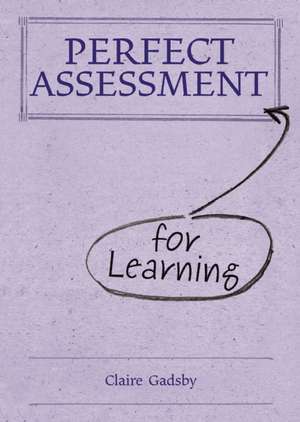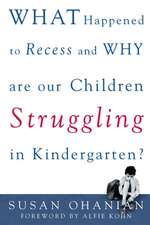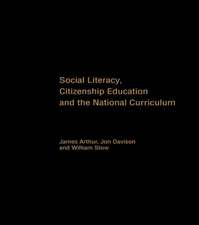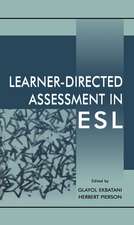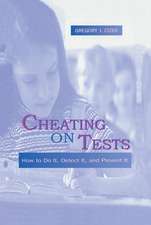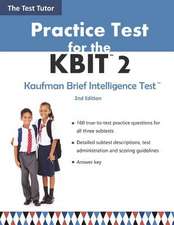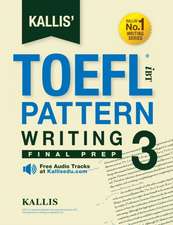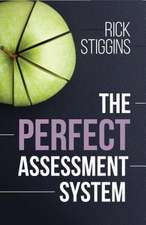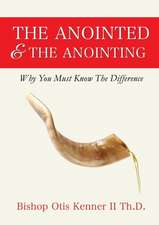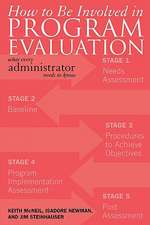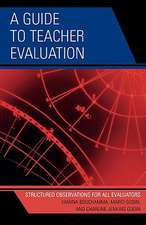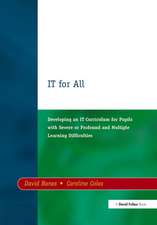Perfect Assessment for Learning: Perfect series
Autor Claire Gadsbyen Limba Engleză Hardback – 19 dec 2012
A simple "how-to" guide for improving achievement by implementing sustainable Assessment for Learning in schools. Includes how to shift staff culture to embed great practice, helping children own their own learning, effective use of learning objectives, and working well with parents.
Perfect Assessment for Learning takes the busy teacher through a range of
strategies to ensure that assessment, progress and learning are inextricably linked.
“Perfect Assessment for Learning provides us with a very
thorough and clear explanation of Afl and puts it well and truly at the heart of school improvement in terms of developing outstanding teaching and learning. I am sure that anyone who is interested in improving learning in their classrooms and schools will find this a stimulating, practical and very effective resource.”
Linda Dawson, Deputy Head Teacher, The Bemrose School, Derby
“This simple, straightforward and easy to digest book reminds us of our responsibility as teachers to ensure that students are making progress and then sends us on our way with a staggering array of inventive learning tools to put the message into practice. An essential addition to the Perfect series: recommended.”
David Didau, Director of Learning and Literacy at Clevedon School
“This is an excellent and practical book which should be readily available for use by all staff in schools – senior managers and the teaching and learning coaches team in particular. Used well, Claire Gadsby’s practical ideas will enhance teaching and learning.”
Mo Laycock OBE, Former Head Teacher
Claire Gadsby is a freelance education consultant, trainer and keynote speaker. She has more than 15 years of teaching experience and was head of English at her last school. She prides herself on being very close to the realities of life in the classroom and regularly team-teaches or delivers demonstration lessons for teachers to observe and critique.
Perfect Assessment for Learning takes the busy teacher through a range of
strategies to ensure that assessment, progress and learning are inextricably linked.
“Perfect Assessment for Learning provides us with a very
thorough and clear explanation of Afl and puts it well and truly at the heart of school improvement in terms of developing outstanding teaching and learning. I am sure that anyone who is interested in improving learning in their classrooms and schools will find this a stimulating, practical and very effective resource.”
Linda Dawson, Deputy Head Teacher, The Bemrose School, Derby
“This simple, straightforward and easy to digest book reminds us of our responsibility as teachers to ensure that students are making progress and then sends us on our way with a staggering array of inventive learning tools to put the message into practice. An essential addition to the Perfect series: recommended.”
David Didau, Director of Learning and Literacy at Clevedon School
“This is an excellent and practical book which should be readily available for use by all staff in schools – senior managers and the teaching and learning coaches team in particular. Used well, Claire Gadsby’s practical ideas will enhance teaching and learning.”
Mo Laycock OBE, Former Head Teacher
Claire Gadsby is a freelance education consultant, trainer and keynote speaker. She has more than 15 years of teaching experience and was head of English at her last school. She prides herself on being very close to the realities of life in the classroom and regularly team-teaches or delivers demonstration lessons for teachers to observe and critique.
Preț: 84.53 lei
Nou
Puncte Express: 127
Preț estimativ în valută:
16.18€ • 16.83$ • 13.35£
16.18€ • 16.83$ • 13.35£
Carte disponibilă
Livrare economică 25 martie-08 aprilie
Livrare express 08-14 martie pentru 19.33 lei
Preluare comenzi: 021 569.72.76
Specificații
ISBN-13: 9781781350027
ISBN-10: 1781350027
Pagini: 131
Ilustrații: illustrations
Dimensiuni: 127 x 175 x 18 mm
Greutate: 0.23 kg
Editura: Crown House Publishing
Seria Perfect series
Locul publicării:United Kingdom
ISBN-10: 1781350027
Pagini: 131
Ilustrații: illustrations
Dimensiuni: 127 x 175 x 18 mm
Greutate: 0.23 kg
Editura: Crown House Publishing
Seria Perfect series
Locul publicării:United Kingdom
Cuprins
Acknowledgements
Foreword by Jackie Beere
1. Beware the AfL ‘Buffet’
2. Sharing Learning Intentions
3. Success Criteria: The ‘Cinderella’ Aspect of AfL
4. Engineering Effective Classroom Discussions
5. Formative Feedback
6. Activating Learners as Resources for Each Other
7. Activating Learners as Owners of their Own
Learning
8. Demonstrating Effective AfL Progress to Ofsted and
Other Stakeholders
9. How to Work Effectively with Parents
10. Winning Hearts and Minds: How to Successfully Embed AfL across the Whole School
11. Key Messages: Moving Forward
Checklist for Perfect Assessment for Learning
Bibliography
Foreword by Jackie Beere
1. Beware the AfL ‘Buffet’
2. Sharing Learning Intentions
3. Success Criteria: The ‘Cinderella’ Aspect of AfL
4. Engineering Effective Classroom Discussions
5. Formative Feedback
6. Activating Learners as Resources for Each Other
7. Activating Learners as Owners of their Own
Learning
8. Demonstrating Effective AfL Progress to Ofsted and
Other Stakeholders
9. How to Work Effectively with Parents
10. Winning Hearts and Minds: How to Successfully Embed AfL across the Whole School
11. Key Messages: Moving Forward
Checklist for Perfect Assessment for Learning
Bibliography
Recenzii
Reviewed by Linda Dawson, Deputy Headteacher, The Bemrose School, Derby.
Claire’s book provides us with a very thorough and clear explanation of AfL and puts it well and truly at the heart of school improvement in terms of developing outstanding teaching and learning. Perfect Assessment for Learning is full of practical, fun and imaginative ways of engaging students and teachers in the learning process. The ‘top tips’ sections are bursting with a wide range of strategies which are easy to implement and establish as routine practice in the classroom.
What is very striking about the book is how important the relationship between the teacher and the learner is. Knowing precisely where our strengths and weaknesses lie as teachers and learners is so important and the more we know in this respect I believe the better the learning and progress will be. I particularly liked the suggestion that effective feedback should be two- way. Asking the students to feedback more regularly on my teaching will be something that I will definitely try, I think I might call it ‘knowing me, knowing you’.
I am sure that anyone who is interested in improving learning in their classrooms and schools will find this a stimulating, practical and very effective resource.
Reviewed by Mo Laycock OBE, former Head Teacher (1995–2010), Firth Park Community Arts College, Sheffield.
This is an excellent and practical book which should be readily available for use by all staff in schools. In particular, senior managers and the teaching and learning coaches team. Used well Claire Gadsby's practical ideas should enhance teaching and learning.
Assessment for learning as Claire describes it should be like a 'golden thread', pulling together effective lesson planning, clear objectives, chunking up the lesson tasks, and ending with an in depth plenary. This consistency across the school is what ultimately moves a school from good to outstanding. Assessment for learning is not an add on or something a teacher embraces when being observed. Indeed prior to being given this label, A for L was what all good teachers did naturally to check on learning. Formalising A for L consistently across a school and using some of Claire's many and various ideas to embed good practice will make a difference to learning outcomes. The opportunities for students to reflect on their learning in pairs, groups, as individuals to help capture and reinforce learning should not be missed.
Used well A for L should underpin the school ethos and practice, being used not just in classrooms but in assemblies, pastoral meetings, corridor conversations and as part of ' restorative justice' approaches.
Claire gives readers opportunities to consider where the school is in respect of A for L as well as some great ideas and pedagogical tips in relation to embedding good learning.
This book should not be on a shelf in school libraries but on the desk of every teacher.
Reviewed by David Didau Director of Learning & Literacy at Clevedon School.
Claire Gadsby's little book is not only crammed with practical wisdom and easy-to-use ideas, but also acknowledges the 'why' of AfL. Too many teachers happily use lolly sticks and traffic lights without really having the slightest idea as to how these strategies will impact on tomorrow’s lesson. This simple, straightforward and easy-to-digest book reminds us of our responsibility as teachers to ensure that students are making progress and then sends us on our way with a staggering array of inventive learning tools to put the message into practice. An essential addition to the Perfect series: recommended.
Reviewed by Joanne Sanchez-Thompson, Education Consultant.
Perfect Assessment for Learning reads well, will be easily understood and digested by its intended audience and has some excellent tips and advice for teachers at any stage of their development.
Reviewed by Tom Barwood M.A. PGCE.
I read Claire’s book once, then I read it again and then I read it again. Initially, when asked to define AfL (normally by a nervous looking NQT), I reply with ‘ask yourself – did the students learn what you wanted them to learn and if so how do you know?’.
Claire’s book actually takes the concept to a much more holistic level than this by positioning AfL as more a form of thinking; one which should permeate everything thing we do rather than being just a box ticking exercise at the end of the lesson.
For both the seasoned professional and the NQT this book is a goldmine of ideas and techniques but more importantly it allows practitioners to apply the principle of Growth Mindset to every part of their teaching – and student learning.
I learned a lot from reading it.
Reviewed by Paul Spenceley, Lead Practitioner for Assessment for Learning, The Rochester Grammar School.
Dylan Wiliam once said, on feedback to students, that it should ‘make students think’. So too should any book aimed at teachers, and this one certainly does. It summarises the key research on AfL into the simplest of points, and uses these to explain simply how teachers can change their style of teaching to make AfL an integral part of their lessons, and how schools can put AfL central to student progress.
Much more than just a collections of AfL ideas to ‘add’ to lessons. This book highlights the importance of AfL being central to teaching. Using key research points sensibly and clearly, along side practical tips for developing AfL at a whole school and classroom level.
Demystifies the key research behind AfL, by simplifying the key facts. Makes the reader realise that AfL is not something you can add to lessons, but a way of teaching. Full of clear and simple ideas for putting AfL at the centre of lessons, and whole school policies.
AfL isn’t what you do, it’s how you do it. This book makes that abundantly clear. Summarising the key points of the latest research in the area, to suggest simple, everyday, changes to lessons and school policies, to make AfL central to student progress.
Claire’s book provides us with a very thorough and clear explanation of AfL and puts it well and truly at the heart of school improvement in terms of developing outstanding teaching and learning. Perfect Assessment for Learning is full of practical, fun and imaginative ways of engaging students and teachers in the learning process. The ‘top tips’ sections are bursting with a wide range of strategies which are easy to implement and establish as routine practice in the classroom.
What is very striking about the book is how important the relationship between the teacher and the learner is. Knowing precisely where our strengths and weaknesses lie as teachers and learners is so important and the more we know in this respect I believe the better the learning and progress will be. I particularly liked the suggestion that effective feedback should be two- way. Asking the students to feedback more regularly on my teaching will be something that I will definitely try, I think I might call it ‘knowing me, knowing you’.
I am sure that anyone who is interested in improving learning in their classrooms and schools will find this a stimulating, practical and very effective resource.
Reviewed by Mo Laycock OBE, former Head Teacher (1995–2010), Firth Park Community Arts College, Sheffield.
This is an excellent and practical book which should be readily available for use by all staff in schools. In particular, senior managers and the teaching and learning coaches team. Used well Claire Gadsby's practical ideas should enhance teaching and learning.
Assessment for learning as Claire describes it should be like a 'golden thread', pulling together effective lesson planning, clear objectives, chunking up the lesson tasks, and ending with an in depth plenary. This consistency across the school is what ultimately moves a school from good to outstanding. Assessment for learning is not an add on or something a teacher embraces when being observed. Indeed prior to being given this label, A for L was what all good teachers did naturally to check on learning. Formalising A for L consistently across a school and using some of Claire's many and various ideas to embed good practice will make a difference to learning outcomes. The opportunities for students to reflect on their learning in pairs, groups, as individuals to help capture and reinforce learning should not be missed.
Used well A for L should underpin the school ethos and practice, being used not just in classrooms but in assemblies, pastoral meetings, corridor conversations and as part of ' restorative justice' approaches.
Claire gives readers opportunities to consider where the school is in respect of A for L as well as some great ideas and pedagogical tips in relation to embedding good learning.
This book should not be on a shelf in school libraries but on the desk of every teacher.
Reviewed by David Didau Director of Learning & Literacy at Clevedon School.
Claire Gadsby's little book is not only crammed with practical wisdom and easy-to-use ideas, but also acknowledges the 'why' of AfL. Too many teachers happily use lolly sticks and traffic lights without really having the slightest idea as to how these strategies will impact on tomorrow’s lesson. This simple, straightforward and easy-to-digest book reminds us of our responsibility as teachers to ensure that students are making progress and then sends us on our way with a staggering array of inventive learning tools to put the message into practice. An essential addition to the Perfect series: recommended.
Reviewed by Joanne Sanchez-Thompson, Education Consultant.
Perfect Assessment for Learning reads well, will be easily understood and digested by its intended audience and has some excellent tips and advice for teachers at any stage of their development.
Reviewed by Tom Barwood M.A. PGCE.
I read Claire’s book once, then I read it again and then I read it again. Initially, when asked to define AfL (normally by a nervous looking NQT), I reply with ‘ask yourself – did the students learn what you wanted them to learn and if so how do you know?’.
Claire’s book actually takes the concept to a much more holistic level than this by positioning AfL as more a form of thinking; one which should permeate everything thing we do rather than being just a box ticking exercise at the end of the lesson.
For both the seasoned professional and the NQT this book is a goldmine of ideas and techniques but more importantly it allows practitioners to apply the principle of Growth Mindset to every part of their teaching – and student learning.
I learned a lot from reading it.
Reviewed by Paul Spenceley, Lead Practitioner for Assessment for Learning, The Rochester Grammar School.
Dylan Wiliam once said, on feedback to students, that it should ‘make students think’. So too should any book aimed at teachers, and this one certainly does. It summarises the key research on AfL into the simplest of points, and uses these to explain simply how teachers can change their style of teaching to make AfL an integral part of their lessons, and how schools can put AfL central to student progress.
Much more than just a collections of AfL ideas to ‘add’ to lessons. This book highlights the importance of AfL being central to teaching. Using key research points sensibly and clearly, along side practical tips for developing AfL at a whole school and classroom level.
Demystifies the key research behind AfL, by simplifying the key facts. Makes the reader realise that AfL is not something you can add to lessons, but a way of teaching. Full of clear and simple ideas for putting AfL at the centre of lessons, and whole school policies.
AfL isn’t what you do, it’s how you do it. This book makes that abundantly clear. Summarising the key points of the latest research in the area, to suggest simple, everyday, changes to lessons and school policies, to make AfL central to student progress.
Notă biografică
Claire Gadsby is a freelance education consultant, trainer and keynote speaker. She has more than 15 years of teaching experience and was Head of English at her last school. She prides herself on being very close to the realities of life in the classroom and regularly team-teaches or delivers demonstration lessons for teachers to observe and critique.
www.clairegadsby.com
Jackie Beere, Head teacher at Campion School, Northants until 2006, is now a consultant, trainer and School Improvement Partner. She spent three years as an Advanced Skills Teacher leading and implementing innovative teaching and learning initiatives including KS3 and 4 Learning to Learn and Thinking Skills programmes. She was awarded the OBE in November 2002 for services to education, having trained many teachers and school leaders in the latest theory and practice of learning to learn and emotional intelligence.
www.jackiebeere.com
www.clairegadsby.com
Jackie Beere, Head teacher at Campion School, Northants until 2006, is now a consultant, trainer and School Improvement Partner. She spent three years as an Advanced Skills Teacher leading and implementing innovative teaching and learning initiatives including KS3 and 4 Learning to Learn and Thinking Skills programmes. She was awarded the OBE in November 2002 for services to education, having trained many teachers and school leaders in the latest theory and practice of learning to learn and emotional intelligence.
www.jackiebeere.com
Extras
Excerpt from The Perfect Assessment for Learning
Foreword:
Once upon a time there was a land where teachers went into school on a Monday with a couple of bullet points written in their diary with ideas of what they may teach that week. As the week progressed a few annotations may have been added to note what work had been completed and where the learning would go next. The names of children who needed to work a bit harder or could take the lead next lesson may even have been added. Occasionally, an interesting idea about homework tasks may have found its way in. And this, my friends, was my planning diary in 1979.
My results were good and getting better each year I taught. However, I look back in amazement at how random and anecdotal teaching was in those early days. ‘Teach one of these texts and let the work grow from there’ my Head of Department told me. How different teaching is now – and how much more rigorous is our planning and assessing to ensure our pupils learn effectively. Much of that essential rigour is now delivered through using Assessment for Learning.
If Assessment for Learning is the answer, what is the question?
How can every teacher ensure that every pupil makes progress?
Every child making optimum progress in every classroom in the land is the hope and dream of all those involved in education from Ofsted and the Minister for Education, to the teacher slogging away planning their lessons on a Sunday afternoon. Consequently, teachers ensure that lessons have clear objectives, build in self and peer assessment and include a plenary which measures progress. They also plan their next lesson to ensure progression for all abilities. So what’s not to like?
Well, like all prescriptive models of great practice, this can become just a ticklist of ideas to be included in lesson plans. But teachers rarely engage effectively with formative assessment as a learning process in the lesson. To really engage with formative assessment you have to be a teacher who has your metaphoric antennae tuned in to what is really happening in your classroom. Are those kids really engaged with that objective or just writing it down out of habit? Do they actually know what progress is in your subject? Or do they just
have the customary target sheets stuck in the front of their books with little or no understanding of what they need to do to improve? Do the pupils find that peer assessment really gives them feedback that helps them move on – or does it
just give the class know-all an opportunity to remind them how inadequate their handwriting is? Does the plenary really tell the teacher whether every individual child has ‘got it’?
How can it if the quiet child at the back holds up their whiteboard with the answer on so that the teacher can’t properly see it? Is your ‘marking’ really making a difference to the progress being made over time for every child? Or do
they glance briefly at the grade you give them and move on to the next thing?
Just planning to use assessment for learning strategies will not give you an assurance that your lesson is outstanding. You need to really care and get curious about what is happening in your classroom and relentlessly go on a quest to find out – by getting feedback from the pupils and noticing what they are doing. The great strength of this book is that it suggests a huge range of ideas and methods to measure progress and empower pupils to take ownership of their own progress. If you use the myriad of strategies in this book you will grow your instincts about the learning happening inside your classroom. As Claire says, progress happens in their heads – if you can tune in using her techniques you will be helping every child make the most of their ability and using assessment as learning.
And that is what I call a happy ending.
Jackie Beere, Tiffield 2012
Textul de pe ultima copertă
Perfect Assessment for Learning takes the busy teacher through a range of
strategies to ensure that assessment, progress and learning are inextricably linked.
“Perfect Assessment for Learning provides us with a very
thorough and clear explanation of Afl and puts it well and truly at the heart of school improvement in terms of developing outstanding teaching and learning. I am sure that anyone who is interested in improving learning in their classrooms and schools will find this a stimulating, practical and very effective resource.”
Linda Dawson, Deputy Head Teacher, The Bemrose School, Derby
“This simple, straightforward and easy to digest book reminds us of our responsibility as teachers to ensure that students are making progress and then sends us on our way with a staggering array of inventive learning tools to put the message into practice. An essential addition to the Perfect series: recommended.”
David Didau, Director of Learning and Literacy at Clevedon School
“This is an excellent and practical book which should be readily available for use by all staff in schools – senior managers and the teaching and learning coaches team in particular. Used well, Claire Gadsby’s practical ideas will enhance teaching and learning.”
Mo Laycock OBE, Former Head Teacher
Claire Gadsby is a freelance education consultant, trainer and keynote speaker. She has more than 15 years of teaching experience and was head of English at her last school. She prides herself on being very close to the realities of life in the classroom and regularly team-teaches or delivers demonstration lessons for teachers to observe and critique.
Descriere
The busy teacher’s guide to using assessment to get the best out of all learners.
